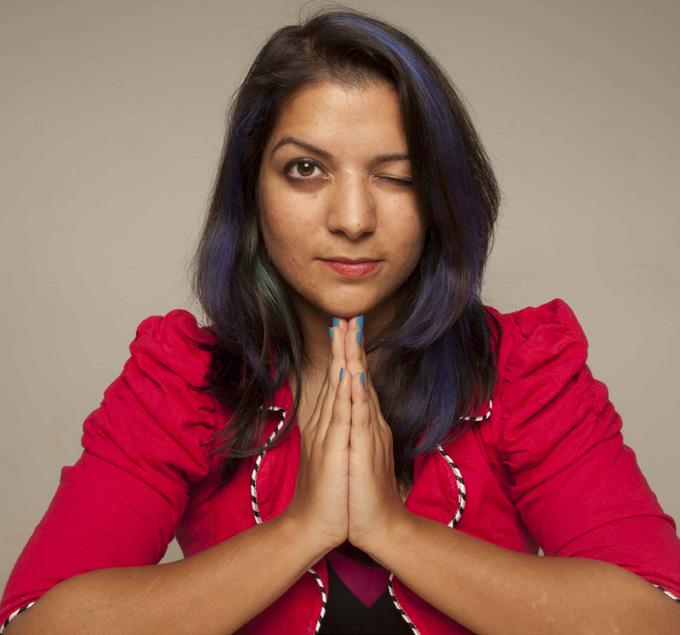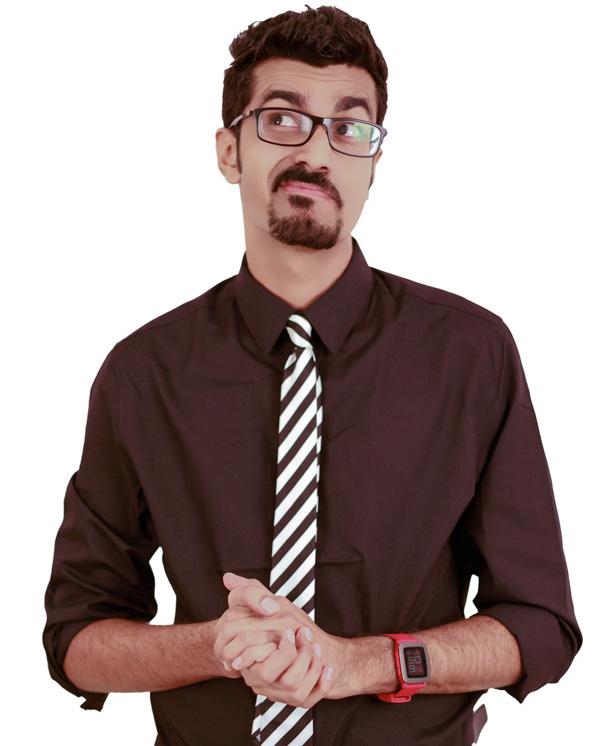
6 minute read
Having the last laugh
from 2018-05 Melbourne
by Indian Link
Three of India’s top comics gave us a peek into their bag of laughs at the Melbourne International Comedy Festival
BY PREETI JABBAL
Laughter, they say, has no foreign accent. And among all the comics celebrating the universal appeal of humour at the 31st Melbourne International Comedy Festival 2018 were our very own Sorabh Pant, Aditi Mittal and Azeem Banatwalla.
Held from March 28-April 22, this was the third largest comedy festival in the world after Montreal’s Just for Laughs and the Edinburgh Fringe Festival. The line-up of laughter makers included some exciting names from India bringing their own experiences to mainstream comedy, to create a wider and a more inclusive reflection.
We spoke to the three stand-ups who enjoy an enormous fan following back home and surely made some new ones here in Australia.
Aditi tells us that as a first-time visitor to Australia cuddling a koala is her top priority. “One of my doubts in life is: if koalas only eat eucalyptus leaf all day, does that mean their breath stays really fresh?” she wonders. A good question, and one that we can’t admit has crossed our minds.
Since all three of them were on virgin territory as far as the Australian audience is concerned, did they have a specific plan of action? “I do not like playing on stereotypes,” says Azeem. “I prefer to report the truth of the matter. For instance, I could talk about how the Australian Government has a huge focus on cracking down on cigarette smoking in terms of price and taxes and it’s great to see them look at health at such a microscopic level.
“In India, however, we have different priorities, we are still trying to get toilets in people’s houses,” he adds.
Azeem quit his job as a travel writer in the end of 2013 to dedicate his creative juices to comedy. He thinks full time stand up is economically viable as a profession currently given its massive uptake in India.”
“Our generation of Indian comedians is lucky to have hopped on to this bandwagon at a time when comedy started booming,” observes Azeem. “We got onto our formative years fairly early on when there wasn’t a lot of competition, and we have also tried to help each other in growing off each other’s success. Starting out now would be a lot harder.”
He adds, “While there is no guaranteed income it allows a comfortable living.”
Aditi, who recently performed at the Edinburgh Comedy Festival, says Indian stereotypes are similar around the world. “Comedy has helped me set my own position in a room full of foreigners,” she reveals. “I can easily joke on where I come from and still feel a sense of belonging that reflects on my content. Our generation of comedians have this in common that we all are in love with where we come from and we are willing to make fun of it.”
Sorabh claims he would rather talk about his take on world politics and other subjects, including Trump, from the perspective of a modern, urban Indian who travels a lot. According to him Australians play hard but are essentially nice blokes who are very willing to take a joke and give it back, making it fun.
Citing the example of his observation of Australian behaviour, he thought former cricket captain Steve Waugh was an absolute tyrant on field, sledging and willing to do anything in order to win, but as soon as he stopped playing he turned out to be the nicest person around.
Sorabh says he is generally impressed by Australian people and Australian talent and intends to watch a lot of Australian stand-up in between his hectic schedule. Responding to how career progression looks like in the comedy industry, Aditi does not think there is any linear promotion; however, she wishes to live a long life and continue to do comedy till she is 80 and beyond. According to her, comedy is all about living and processing life as one gets on stage.
Sorabh on the other hand thinks his progression was ‘ass backwards’. He was a TV writer and did not necessarily start off with Open Mics; he started dabbling with comedy initially with clichéd jokes and had never thought he would end up in this profession.
All three concur that social media exposure comes with its pros and cons as far as their comedy careers are concerned. Azeem shares a recent experience in Melbourne where he walked into a Woolworths store and the attendant from an Indian background recognised him. “No matter how big a show you do, word of mouth can only go so far. I have done shows of 5000 people and if the video of the show does well then it still reaches half a million people across the world, creating a huge audience,” he says.
“I keep reflecting on our self-esteem as a people and what power we speak from,” says Aditi. “Do we speak from utter helplessness, power or anger, and where do we come from emotionally? Social media is one of the reasons we are famous. Sure, it is getting increasingly ugly and >
> toxic, and we comedians do have to put up with a lot of flak on social media.”
Sorabh’s Rant of the Pant video series in 2017 garnered nearly 25 million views in a year and he has also done three Amazon prime media specials so he is certainly not complaining. “Everything gets exacerbated on social media. I got a lot of hate from Salman Khan fans for joking about his recent arrest. But I am not going to complain because most of our careers took off because of social media. You got to take the good with the bad,” he says.
One thing we tend to notice a lot these days among stand-ups is the use of expletives. Can comics be funny without using them? Sorabh claims he may have used the F-word a lot in the beginning, but not anymore, because it could subconsciously turn into a crutch.
Azeem, on the other hand, says it all depends on the emotion in that moment. “I do not add it consciously to my script but it can happen if I want to keep it natural. Most people tend to use some sort of profanity in their normal conversations if they feel strongly about something.”
Aditi thinks one of the hallmarks of comedy is to say what is on your mind. So if that means using an expletive now and then is fine. “If you use it to establish a connection in a normal conversation, that’s acceptable. But don’t use it as a filler,” she says.
It was fun for the broadminded at the Indian All-Star Comedy Showcase hosted recently by the Melbourne International Comedy Festival (MICF).
Integrating their niche experiences with the wider world, four Indian stand-up comedians prompted numerous laughs and a few guffaws over the hour-long show.
The spotlight was on religion, sex and the mundane, and the comedians deftly delivered their punches scoring comedic bullseyes.
Aditi Mittal as the host of the showcase cavorted about the stage telling her stories with unabashed glee. Yet the content of her show was nowhere as animated as her personality.
Aditi called out sexism and championed feminism with her jokes, and although there were hits as well as and misses, she revved up the crowd with every appearance.
Sorabh Pant delivered an assured combination of insightful punches and easy laughs. The overall energy was surprisingly low but his life observations helped him construct a polished 15-minute segment.

Rahul Subramanian ruled the comedic roost with his timing. His jokes were served deadpan, followed often by an imaginative pause that kept the audience suitably intrigued.
Masking his satirical sights under goo ness, Rahul jumped from one unrelated topic to another. Anecdotes of driving with his wife took up bulk of his entertaining segment.
A memorable bit was when Rahul got the men in the house to give him a cheer and the women in the house to give him a cheer. When they did, enthusiastically, he blamed them for ‘being sexist’ because why should women be in the house?
The last 15 minutes were taken up by Azeem Banatwalla as he touched interestingly on being a Muslim and provocatively tackled the idea of joking about his religion.
“If I said these things in India I would be bombed,” he claimed, as he remarked on the freedom of joking about Islam without raising bedlam, thanks to his broadminded audience.
The audience had more of a good chuckle than constant stitches and the hour passed too quickly.






